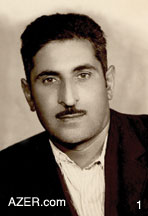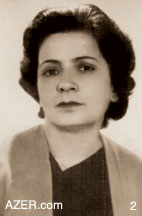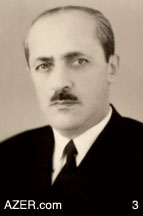|

Spring 2006 (14.1)
Pages
90-94
Stalin's Legacy
Dissolution of the Family. "Don't Wait for Me"
by
Naila Hasanova
  One
of the saddest legacies of Stalin's policies was the dissolution of so
many families. Across the expanse of the entire Soviet Union,
millions of families were left broken and destroyed - even
when prisoners managed to survive and return home. It seems no
family was left untouched by Stalin's Repressions. One
of the saddest legacies of Stalin's policies was the dissolution of so
many families. Across the expanse of the entire Soviet Union,
millions of families were left broken and destroyed - even
when prisoners managed to survive and return home. It seems no
family was left untouched by Stalin's Repressions.
Naila Hasanova, 69, tells the story of her parents - Samaya and
Anvar - who enjoyed six difficult, but impassioned, years of marriage
before World War II separated them. Anvar survived the war front
although many Azerbaijanis didn't. But when he returned home,
the trauma wasn't over.
Soldiers who had been captured and interred in German prison
camps were viewed as "Enemies of the People" by the
Soviet regime because Stalin had ordered those in the military never to allow
themselves to be captured. And so immediately after returning
from the war, the soldiers who had been imprisoned were hauled off to Soviet hard labor
prison camps - sometimes for many years. Stalin used this as
a ploy to exploit his own citizens and use them as slave labor
to develop the natural resources, especially in less developed
regions of the country.
That's what happened to Naila's father Anvar Hasanov. After serving
three years in the war, he was sentenced to 10 years in a prison
camp near the Arctic Circle. Fearing that he wouldn't survive,
he wrote his young wife and encouraged her to remarry and save
herself and the two children.
Broken hearted, she followed his
advice. Many women faced the same dilemma. But Anvar did
survive the tortuous years of prison camp and he did return home,
only to face the painful reality that, indeed, the true love
of his life had remarried and, because of the circumstances,
she had done exactly as he had told her to do - not wait for him. Her daughter
Naila reflects here nearly 70 years later about the impact Stalin's
repressions had on her family.
Early Years
My mother Samaya (1913-1962) was a chemist and my father Anvar
(1913-1993) was an oil engineer.
They both were born in the same year. Both attended the same
high school and the same university, graduating from the Azerbaijan
Oil Chemistry and Industry Institute (now Azerbaijan Oil Academy).
My father graduated from the faculty of Oil Mine Engineering,
and mother took her degree in Chemical Technology. Her dissertation
was about the mysterious underground rivers that flowed beneath
the city of Baku.
So my parents fell in love and got married in 1935 although her
parents felt that they were too young. They had a crazy love.
In 1937 they gave a birth to a son Rufat, who died of measles.
Then I was born in 1938, and two years later, my sister Elmira
came along. My parents lived together for only six years.
At that time, father was working for AzNeft [AzNeft: An oil company
in Azerbaijan. The word "neft" means oil]. Actually,
during World War II everyone in Azerbaijan who worked in the
oil sector was exempt from serving in the military because Azerbaijan's
oil played a major factor in countering the Germans [Azerbaijan
contributed the majority of oil that was used in the Soviet effort
to defeat the Germans. Azerbaijan deserves much credit for their
incredible role in helping the Allies to gain the victory in
World War II].
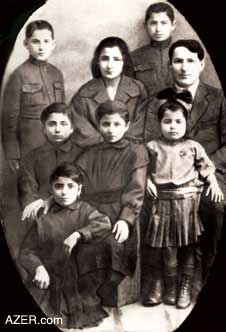  But
my father had a sharp tongue. In one of the meetings, he started
complaining about the Soviet system, perhaps in a joking manner.
It was Stalin's era, and, of course, someone denounced him right
away. People often would report on each other just to gain favor
of those in high positions. Soon my father's exemption was removed
and he was sent off to the war. This happened in 1942. I was
four years old; Elmira was two. But
my father had a sharp tongue. In one of the meetings, he started
complaining about the Soviet system, perhaps in a joking manner.
It was Stalin's era, and, of course, someone denounced him right
away. People often would report on each other just to gain favor
of those in high positions. Soon my father's exemption was removed
and he was sent off to the war. This happened in 1942. I was
four years old; Elmira was two.
Father was sent to the Kerchi division in the Black Sea region
of Crimea. It was quite a famous division and most of the soldiers
were Azerbaijanis. But the Germans captured the entire unit.
My father was sent to Osvenson and Dakhao labor camps in Germany
as a prisoner of war. Father could have stayed on, found a job
and lived in Germany as he knew the language. But he came back
to Azerbaijan in 1945 for mother and us.
Then came Article No. 50, which declared that all soldiers who
had been prisoners of war in the enemy's land were considered
"Enemies of the People" back home. Since my father
had been held in German prison camps, that meant him and, predictably,
they came and arrested him.
Stalin insisted that soldiers should never allow themselves to
be captured; they should kill themselves rather than be taken
captive. But there were thousands of soldiers in the Kerchi camp
and the entire camp was taken. How could so many people kill
themselves? And why?
I'll never forget the day when the NKVD agents [Azerbaijan contributed
the majority of oil that was used in the Soviet effort to defeat
the Germans. Azerbaijan deserves much credit for their incredible
role in helping the Allies to gain the victory in World War II]
came looking for father. It was December 19, 1945. My sister
was only five years old but she also remembers it well. It was
such a traumatic experience that we never forgot despite how
young we were. The agents turned our house upside down. My sister
and I were sitting on the couch. They came in and searched the
whole house, ransacking the house and turning everything upside
down. They couldn't find anything. We didn't even know what they
were looking for - maybe guns, maybe letters from Germany. We
never knew. .
We had a little suitcase, and they told father to put his stuff
in it. Elmira asked: "Daddy, are you going to the bath house?"
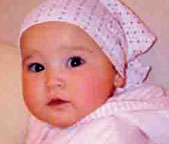  Left: Samaya, the granddaughter of Naila's sister, who
was given the real name of her greatgrandmother. Finally, the
family is choosing this name again. The last generation associated
"Samaya" with too much pain brought on by Stalin's
repressions. Left: Samaya, the granddaughter of Naila's sister, who
was given the real name of her greatgrandmother. Finally, the
family is choosing this name again. The last generation associated
"Samaya" with too much pain brought on by Stalin's
repressions.
I was watching them with big wide curious eyes but I couldn't
understand what they wanted from us. And then they took father
away. Little did we know we would never see him again until 1956.
They kept father in Baku's Keshla prison until March 30, 1946.
We used to take him parcels but were never allowed to see him
or meet with him. Official documents indicate that on April 24,
1946, the court sentenced him to exile at Vorkuta, a city on
the Vorkuta River in the Autonomous Republic of Komi ASSR [The
Komi Autonomous Soviet Socialist Republic was established in
August 22 1921. It is located in northwest USSR close to Europe.
The climate is quite severe. The average temperature in January
varies from between 15 to 20C (5 to 4F), in July,
it ranges from 11 to 16C (52 to 61F). [Wikipedia: April 27, 2006].
In northwestern Russia close to Finland.
Later he told us that they had had to walk much of the way to
Vorkuta. It was called "etap", meaning "on foot".
Of course, they went some distance by train, horseback and even
dogsled, but they walked a considerable distance, too. Many prisoners
died along the way. Father was clever; he managed to stay alive.
He used to tell us stories of how they foraged for food to stay
alive. They would eat raw potatoes, tree bark, leaves, grass,
and roots of plants.
Father was not allowed to write us. Article No. 58 denied permission
to the Prisoners of War to correspond, but somehow he managed
to send us two letters during those 10 years he was in exile.
We received the first letter in 1948 while we were living in
Shusha. He had passed it through various people, not the post
office.
I remember the day that it came as if it were only yesterday.
I was 10 years old. My little sister and I were sitting together
and mother read it to us. Father wrote that they were living
under very bad conditions and that they had been told that they
would have to stay there for the rest of their lives. He told
mother not to wait for him and to marry someone else, and to
create a good life for all of us.
In the second letter that arrived three years later, father let
my mom go free because he doubted that he would ever come back.
He knew that we were suffering a lot because we had his last
name. Again, he told her to try to make a good life for us, and
to change her last name and ours. That letter was very painful
for mother; it must have been the same for father.
Our apartment in Baku was close to the sea. It was in a big,
old house near Taghiyev's Musical Comedy Theater [Taghiyev's
Musical Comedy Theater was rebuilt in 1998. It is located on
Neftchilar Avenue not far from the Marionette Theater and Maiden's
Tower]. One of the apartments on the first floor used to be ours,
but the government took it from us and left us only with one
room. Other people were assigned to live in the other rooms.
What could mother do?
And then the order came telling us to go to the NKVD office because
they were gathering all the families of "Enemies of the
People" so that they would leave the country for Kazakhstan.
They gave us 24 hours. It was 1948. My mom had strong relatives.
My mother's sisters were doctors and in a strong financial position.
They gathered and decided that they must find a way so their
sister would not be exiled from the country. They were so afraid
that we would all die on that long harsh journey to Kazakhstan.
Mother was a small, fragile woman.
Stalin's Repressions
devastated so many families and broke up so many marriages: (1)
Anvar Hasanov (1913-1993), (2) Samaya Hasanova (1913-1962) who
later married (3) Mustafa Mammadyarov. Anvar was Samaya's first
husband and deep love throughout her life. They had two children
before he went off to World War II. When he returned, Stalin
sent him off to labor camp because his unit had been captured
in Germany. The government policy required that the wives of
such prisoners should also be sent into exile with the children.
Mustafa Mammadyarov who had known Samaya since youth rescued
the situation by marrying her and providing for her children.
But then Anvar returned to discover that no family was waiting
for him. Despite Samaya's love for her first husband, she did
not return to him because of the kindness of her second husband
through all the difficulties. Samaya's children are convinced
that the stress of this situation is why she died of cancer at
the young age of 49.
Fortunately, she was quite attractive and men liked her. Many
of them had been friends with her and my father since high school.
Among them, there was one - Mustafa Mammadyarov - who loved mother
very much. He knew the entire history of our family. He was divorced
so he asked mother to marry him and promised to take care of
us two girls. Actually he was the only one who promised to take
care of us, her daughters. And he did his best, he really did.
That way we could change our last name and not be exiled to Kazakhstan.
Within the allotted 24 hours mother went and registered the marriage
and officially changed her last name. They weren't actually married
yet, but the agreement was official. The marriage took place
later.
|
"Father wrote
that they were living under very bad conditions and that they
had been told that they would have to stay there for the rest
of their lives. He asked mother not to wait for him, but to make
a good life for herself and us children."
-Naila Hasanova,
describing the terrible dilemma that her mother face when her
husband was sent into exile.
|
Mother's relatives insisted that she do this. Her second husband
Mustafa was also an oilman just like Anvar had been. Mother changed
her last name, but we children kept ours. Now mother was no longer
the wife of an "Enemy of the People", and we didn't
have to deal with the problems that we had faced earlier.
Father was trained as an oil engineer, but in Vorkuta where there
was no oil, he worked in the coalmines. He became good friends
with some of the German prisoners of war because he knew their
language so well. The Administration of the camp used my father
as an interpreter. In 1949-1950, they started returning German
prisoners back to their country. Up until then, the Germans had
labored all over the Soviet Union and constructed many of the
buildings [Buildings that German prisoners built can still be
seen in Baku, the most well-known of them is the Government House
on Neftchilar Avenue near the Caspian].
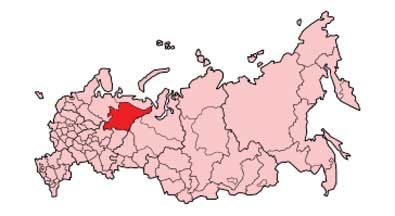
My grandmother went to visit my father in the Arctic polar camp
in Vorkuta, Komi. She was a real heroine. She gathered all the
necessities she thought he might need, and took a train to Moscow.
The journey from Baku to Vorkuta took her 18 days. I don't know
what kind of transportation she used but she was determined to
find her son and to make sure that he was still alive. After
that, she returned to Baku. A year later, she went to visit him
again.
And then father came back home. The hardest part for mother was
when he came back. Imagine her situation. She loved him so much
but now she was married to someone else and had a child by this
second husband who for years had so kindly protected her in this
personal crisis.
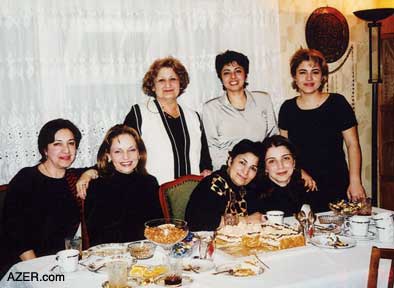 |

|
Above: Samaya Hasanova's descendents: (From
left, sitting): Naila's half sister Zemfira (Mustafa's daughter),
Zulfiyya (daughter-in-law of Elmira), Naila Hasanova who authored
this article, Zemfira's daughter Sona. Standing (from left):
Naila's sister Elmira, Naila's daughters: Nargiz and Samira.
Right: Jamila (Naila's granddaughter). Photo:
2003.
Psychologically, it was almost unbearable for her. Who can comprehend
her pain? Who can understand her heartache? My sister and I analyzed
the situation for many years after her death, and we think that
she developed brain cancer because she had to deal with so much
stress in her life. She really died at a very young age - 49
- in 1962, only six years after father returned.
We saw father a lot after he returned. We used to spend time
together. He used to see mother, too, but only at large gatherings
such as weddings, funerals. They had common friends as they knew
the same people and moved in the same circles. When mother died
in 1962, father would go to the cemetery every day and place
one flower - just one - on her grave. He did that for two years.
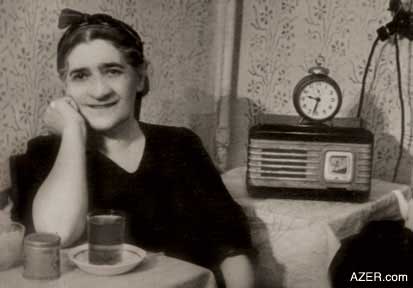
We children wouldn't let her go back to father. We figured that
we had grown up without a father and didn't want our younger
sister to grow up without having a real father. We thought that
our little sister should live with her real father. Though we
were proud of that decision at the time, now that I look back
on it, I think it probably wasn't the wisest thing. Mother suffered
so much. She loved my father - her first husband - throughout
her whole life.
My father was deeply pained as well. He waited for mother to
come back to him. He really believed that their love was so strong
that she would do it. But then she became ill and died. Father
remarried two years later, in 1964.
When father came back from the war front in 1945, I was only
seven years old. I didn't understand so many things at that time.
But I was 18 by the time he returned from Siberia in 1956, and
I could comprehend what was happening.
After father returned home in 1956, like other prisoners of war,
he was not allowed to live in any major city. They sent him to
Ali Bayramli, about an hour and a half south of Baku. He worked
in NGDU as head engineer. Fifty years ago, he was involved in
the discovery of oil in Ali Bayramli. He continued to live there
for two years (1956-1957). After that, he was allowed to settle
back in Baku where he worked for AzNeft on the island of Peschani.
After Khrushchev's death in 1964, the government started to send
professionals to various foreign countries to work. Decisions
were made in Moscow. They called father there and told him that
they wanted to send him to India as an advisor on a major oil
projects. So he went to India in 1969.
|
"I always tell
these stories to my grandchildren. I want them to know who their
grandmother was. I want my children and grandchildren to be like
her. 'You are the grandchildren of Samaya,' I tell them. This
is the greatest legacy that she could ever have given us - the
model of her life, even under incredible duress."
-- Naila Hasanova
|
He worked there for five years
and helped to establish an offshore petroleum project for them.
He even received a gold medal from Indira Ghandi acknowledging
his work. Later, he worked in Czechoslovakia and received a Czech
medal, too. After that, he worked in the Romanian oil sector.
After mother died, we introduced father back into our family.
This had been impossible prior to her death. After that, my stepfather
and father became friends. They both had suffered the same grief
when she died, but then they became very close friends.
Stalin's Legacy
Today
So many of Azerbaijan's smart, intelligent, talented people were
wiped out. That's Stalin's legacy to us today more than 50 years
after his death. Many of our most capable individuals died in
camps, and even those who returned home after many years, usually
did not live much longer. Look at mother who was left to have
to cope with all of these things. She died from stress. I'm convinced
that her cancer came from stress.
In regard to Stalin, when I was growing up, a personality cult
had developed around him. I attended a Soviet school where Stalin
was like God. I was a kid and didn't realize that everything
that my family had suffered was because of Stalin. In 1953, when
Stalin died I was in the 7th grade. The entire class was sitting
there, crying. I was crying, too. I didn't know that Stalin was
responsible for all these repressions.
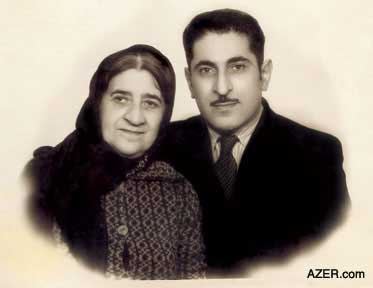
Above:
Anvar with his mom in 1955,
the second time she went to visit him in the prison camp. Twice
she made journeys alone to the arctic labor camps to find her
son Anvar. The trip took her 18 days. Naila calls her grandmother
a "heroine".
Imagine when Khrushchev announced at the 20th Congress in February
1956, three years after Stalin's death that Stalin had organized
all these repressions. All of us were in shock. We couldn't believe
it. We didn't know that Stalin was the one responsible for all
our pain. We always thought that those who were arrested or killed
during those years were real "Enemies of the People".
At the 20th Congress Khrushchev exposed and condemned this personality
cult.
Every person in Azerbaijan has painful stories about the repressions.
Unfortunately, there's not a single book where all these stories
have been collected. Mehdi Husein was the only Azerbaijani writer
who dared to write a novel about the repressions during the Soviet
period. It was published in 1966, a year after he died. Its title
is "Underground Rivers Flow To The Sea". It's really
about my mother. My mother and Mehdi's wife Fatma had been friends
from childhood.
Mehdi Husein as editor of Azerbaijan Literary magazine first
published "Underground Rivers" in chapter sections
in 1964. Unfortunately, he did not live to see his book come
out in book format. The following year when he was only 56 years
old, he had a heart attack right in front of an assembly of the
Writer's Union - when some of the outspoken figures attacked
and sharply criticized him.
Mehdi had intended the book to be published in Russian to have
broader distribution. Amazingly, the novel did come out in 1966
in book format - one edition. [Solzhenitsyn had published "One
Day in the Life of Ivan Denisovich" in 1962 but only with
the authority of Khrushchev who was trying to strengthen his
own position and undermine Stalin's.
Solzhenitsyn's "Gulag Archipelago" appeared as a published
book first in the West in 1970, having been smuggled out of the
Soviet Union. It was extremely rare for a Soviet writer to dare
to attack the Gulag system openly until Gorbachev's time in the
mid-1980s.] "Underground Rivers Flow To The Sea" was
the only novel ever published about exile in Azerbaijan during
the Soviet period.
Amazing Mother
The author named his protagonist Samira Aydin. In other words,
though he didn't use my mother's name exactly, he retained her
initials - SA - Samaya Aghayeva.
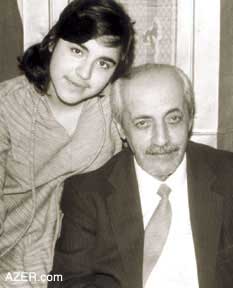  Left: Naila's daughter Samira with her grandfather Anvar.
Samira was given the pseudonym that her grandmother is called
in Mehdi Husein's novel "Underground Rivers Flow Into the
Sea" by 1983. Left: Naila's daughter Samira with her grandfather Anvar.
Samira was given the pseudonym that her grandmother is called
in Mehdi Husein's novel "Underground Rivers Flow Into the
Sea" by 1983.
When my daughter was
born, I named her Samira - Mehdi Husein's name for my mother.
Neither my father or my stepfather would give me permission to
call my daughter by mother's real name as it brought back such
difficult memories, only reminding them that she was not with
us anymore.
But years passed and my sister did name her granddaughter Samaya
after mother. We really wanted so much to keep the name of our
mother in our family.
Mother was such a great woman - intelligent, calm, and very kind.
She had so many friends.
Actually, when I was growing up, my mother treated me more like
a girlfriend. We used to solve our problems together. Even when
mother decided to get married overnight to save us from going
to Kazakhstan, she talked to me about her dilemma, asking my
opinion. I was only 11 years old at the time. My mother always
trusted us.
Trust is such a fundamental thing and I, in turn, trust my children.Mother
always worked a lot. She held down two, three jobs. She became
the Deputy Director of a chemical laboratory. Actually, she was
the first chemist to earn her candidate of sciences degree.
I learned many things from childhood. When I was five years old,
I had to take care of my sister while my mother was at work.
I would take my three-year-old sister to kindergarten, while
I was going there myself.
My mother was a small woman but she had a strong character. She
did everything for us. Even today, we hold her up as model for
us.
Whatever major decision we have faced in life, we would always
think whether it would make our mother happy or not. Even now
when I do something, I always think whether my mother would approve
of it or not.
If this tragedy had not happened to our family, everything would
have been so different now. My mother and father loved each other
more than anything else. They had a deep friendship. Everyone
knew my mother and father loved each other. They both were so
talented. Our life would be happier. And the most important thing,
I don't think that my mother would have died so young.
I always tell these stories to my grandchildren. I want them
to know who their grandmother was. We - the daughters of Samaya
- always aspire to be like her. I want my children and grandchildren
to be like her.
I always tell them that whenever they think of doing something
bad remember: "You are the grandchildren of Samaya."
This is the greatest legacy that she could ever have given us
- the model of her life, even under incredible duress.
Naila Hasanova graduated from the Physics faculty of Baku State
University and she teaches physics as a Senior Lecturer in the
Physics Department of the Azerbaijan Oil Academy. Her daughter
Nargiz Rizazadeh and sister Elmira also contributed to this article.
Back to Index AI 14.1 (Spring
2006)
AI Home
| Search | Magazine
Choice
| Topics
| AI Store | Contact us
Other Web sites
created by Azerbaijan International
AZgallery.org | AZERI.org | HAJIBEYOV.com
|






